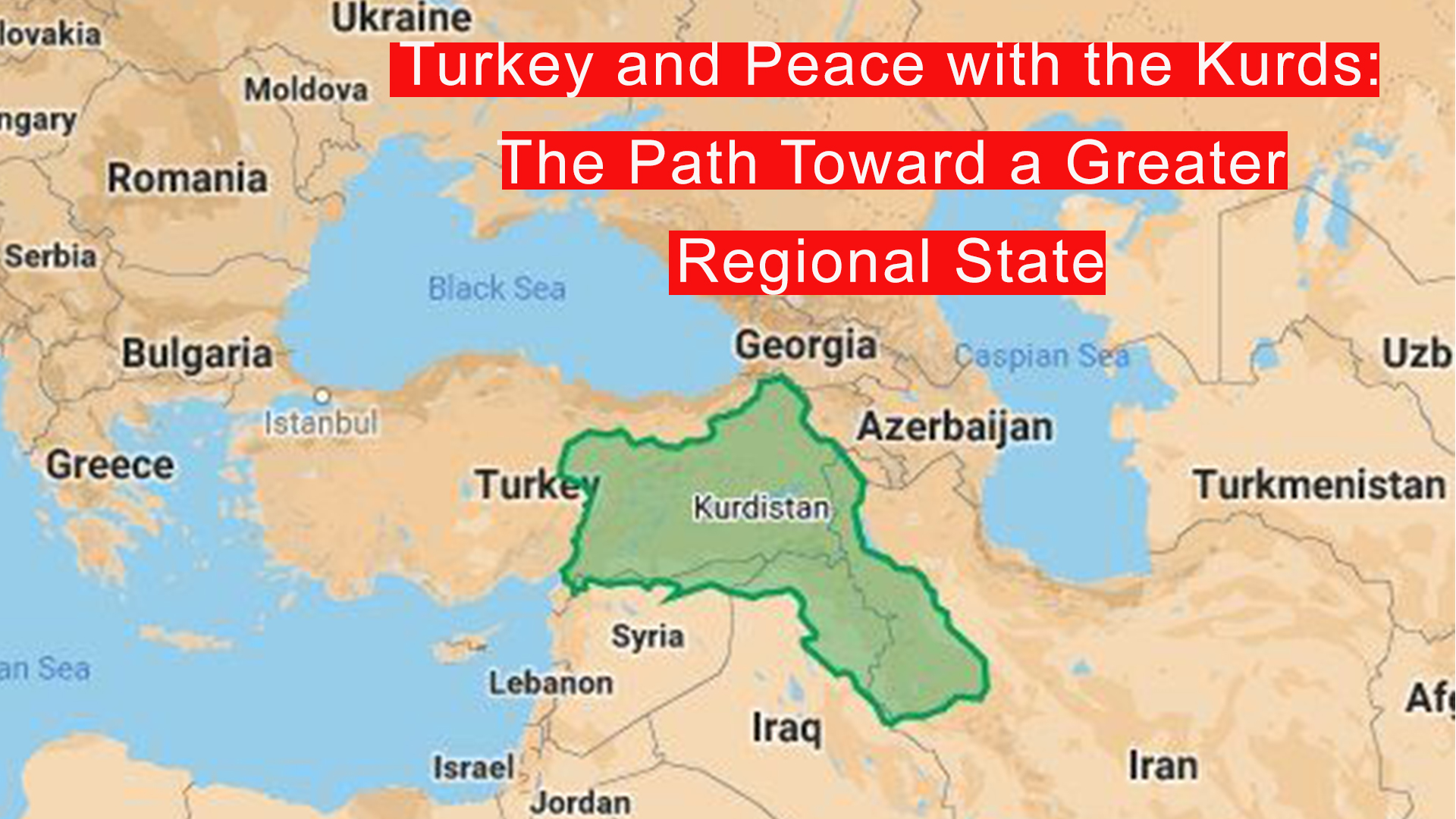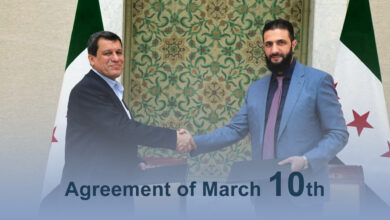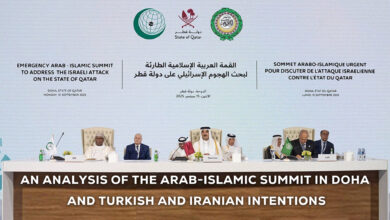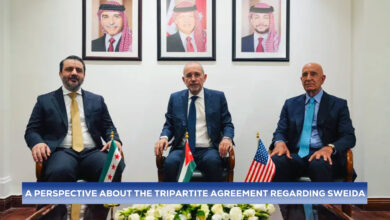Turkey and Peace with the Kurds: The Path Toward a Greater Regional State
Dr. Murshid Al-Youssef

In the political geography of the Middle East There is no issue more complex and entanglement than the Kurdish issue, and there is no state more intertwined with this issue. More than Turkey; since the founding of the modern Turkish Republic on the ruins of the Ottoman Empire, the Turkish state has pursued a policy of denial with the Kurds, despite the fact that the Kurds are an indigenous people whose presence in Anatolia extends back many centuries.
However, this policy only led to the recurrence of violence and the outbreak of bloody confrontations between the state and the Kurdish movements. The bloodiest of these confrontations was the ongoing conflict with the Kurdistan Workers’ Party since 1984.
But the question that is being asked today, and strongly, is:
What if Turkey actually changed its compass? What if it took the path of true peace with the Kurds?
The answer will be clear; it is:
Turkey will transform into a larger regional power, freed from its internal constraints, and more capable of drawing the maps of the region rather than having them drawn for it.
Many observers agree that the Kurdish issue within Turkey represents a paralyzed half of the national body. The Kurds, who constitute about 20% or More than the country’s population remained for decades on the margins of the Turanian nation-state, without recognition of their language, fair representation of their identity, or real participation in political decision- making.
This exclusion has produced a long-term revolutionary situation that has exhausted the state, weakened its security infrastructure, and thwarted many development opportunities in the regions of eastern and southeastern Anatolia, regions rich in human resources and wealth.
Success in achieving true peace with the Kurds is not merely a political agreement, but rather the reintegration of millions of citizens into public life, and the liberation of their wasted energies in building the state rather than confronting it.
It is certain that Turkey lives in a region full of transformations, the collapse of political systems, and the rise of powers. …which constitutes new identities, and is witnessing shifts in the balance of power. In order for Turkey to play a leading role in this changing environment, it must get rid of its structural weaknesses, the most important of which is the internal conflict with the Kurds. Peace with the Kurds domestically will open the door wide to a radical transformation in Turkey’s relationship with the Kurds abroad, especially in Syria and Iraq, instead of adopting a military approach and violent interventions. Ankara can use soft power tools, such as: the economy, language, common interests, and even cultural ties, to build real and sustainable influence across the Kurdish geography.
If Turkey adopts a democratic project that accommodates the Kurds, it will block the path for its opponents to exploit the Kurdish card, and it will be able to formulate a comprehensive regional role, not based on conflict. But on interaction and integration.
Experts estimate that the armed conflict with the Kurds has cost the Turkish economy billions of dollars, both in military spending and in disrupting development in vast areas of the country.
Peace here is not only a moral choice, but it is also an economic necessity; the Kurdish regions are rich in natural resources, have a young population density, and have large markets. With their openness, they could become real engines of growth, especially if linked to cross – border energy and infrastructure projects, towards Iraq and Syria.
There is no doubt that Turkey today, under the microscope of the West and the world, is accused of violating human rights, suppressing freedoms, stifling the media and the opposition, and excluding the Kurds. This image costs it a lot in terms of foreign policy, and limits its ability to build effective alliances.
But openness to the Kurds, and recognizing them as equal partners, may change this picture. And redraws it a new, and grants Turkey new legitimacy as an emerging democratic state capable of presenting a third model in the region, a model that is neither sectarian nor nationalist, but rather pluralistic and consensual.
Turkey now faces a historic opportunity. Just as the Kurdish issue has been a source of its depletion for decades, peace with the Kurds could be its gateway to the future and a necessary condition for its transformation into a major regional power. However, peace is not just a declaration of intent, but rather a complex path that requires political courage, an explicit recognition of rights, and a reformulation of the social contract between the state and its components. Only then can Turkey free itself from its closed nationalist legacy and open a new page, not only with the Kurds, but with itself as well.
This can be achieved through:
-Constitutional recognition of Kurdish identity:
By explicity including the Kurds as a language, culture and identity in the Turkish Constitution, as an authentic component of the pluralistic Turkish nation, and also by abandoning the concept of “Turkish citizen by identity only.” Which reduces pluralism to a single nationality.
– Opening the political arena to Kurdish parties:
Lifting the political and legal ban on representatives of Kurdish parties, especially the Dem Partî, ensuring their full participation in parliamentary and municipal life, and stopping the campaigns of distortion and political criminalization.
– Launching the peace process with national transparency:
Resuming the political dialogue process with the Kurds through official negotiations under national auspices, with the participation of civil society, and with symbolic international supervision that lends legitimacy to the process and ensures the commitment of all parties.
– Ending the unilateral security and military approach:
Stop military operations against Kurds inside Turkey and outside of it, adopting security policies based on respect for the law and human rights, in parallel with truly addressing the issues of violence and conflict in the Kurdish regions, through restorative justice and comprehensive development.
– Investing in the development of Kurdish regions:
By launching a major economic plan to rebuild and modernize the regions of eastern and southeastern Anatolia, including infrastructure, education, health, and job creation, thus ending historical marginalization and creating an equal partnership between the state and Kurdish communities.
– Promoting Kurdish culture in media and education:
is achieved by opening official and private media channels in Kurdish, and by including the Kurdish language, literature, and history in school curricula, as part of the national culture and diverse Turkish national heritage.
– Adopting the model of equal citizenship state:
By moving towards a political and social model built on the basis of equal citizenship, rather than national or religious affiliation, thus guaranteeing equal rights for all citizens and ending the logic of the ruling national identity.
– Using internal peace as a regional power card:
This is done by translating reconciliation with the Kurds into a regional lever for Turkey; By building positive relations with the Kurds of Syria, Iraq and Iran, based on common interests and cultural ties, and not on military interventions or intimidation.
It is certain that building a historic peace with the Kurds is not only a rational choice, but a strategic necessity for Turkey’s political, economic, and demographic future. Power is not built by force, but by partnership and mutual trust. A Turkey that ends its hostility with the Kurds is a new Turkey, a major regional power, stable internally, and effective and influential abroad.




